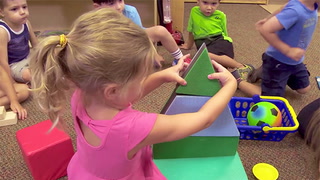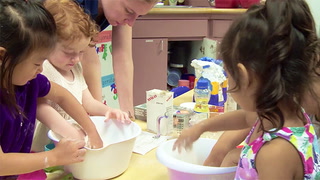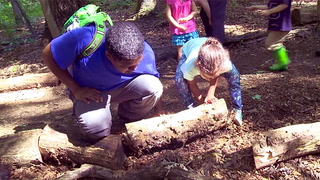Environmental Science: Learning Through Nature Transcript
Speaker 1: An example of an insect because you can actually see the three body parts and the six legs. That's what makes up an insect. That's why kids are like, "Oh!"
Speaker 2: Children are born naturally curious about the world around them. They learn best through their own discoveries, hands-on experiences, and sensory engagement. Giving young children the opportunity to become outdoor explorers, beginning in the backyard or neighborhood, on the playground or at a nearby park, helps them learn about themselves, their capabilities in a world in which they live.
Speaker 1: This is a larva for what we call a Bess beetle or a patent leather beetle. Can you guys see that? It's the baby, it's not a full grown-up beetle yet.
Speaker 2: The earlier and more frequently that young children are given a chance to interact with nature, the sooner they will begin to make connections between their actions and the natural environment.
Speaker 3: Wanna try? Let's see, how are we gonna do this?
Speaker 2: Families and early childhood educators play an important role in introducing children to outdoor exploration. Adults don't have to be experts in environmental science to take children on a nature hike, help them to plant seeds in the garden, read a story on a picnic blanket at the park, or use crayons and colored pencils to draw wildflowers in a field.
By spending time together and sharing nature, exploration families and educators can foster children's critical thinking and support them as they make observations and ask questions.
Speaker 1: What'd you find, [Inty 00:01:26]? Did you find a worm, too? Awesome. Very cool. Oh, you're giving to me? Very cool. Alright.
Now we're gonna grow into big trees, or big plants, whatever you wanna be. They wave in the wind and they pick up some more food from the sun. It gets some more water from the rain.
Being with your child out in nature, it helps both adults and children because they just become calmer, they become engaged with what nature has to offer them.
Speaker 4: It's really terrific when families understand how important it is to engage with their children in exploring the environment.
Speaker 1: What happens is if she gets scared or if she thinks something wants to eat her she can bring in all of her legs and her head, and even her tail and she closes up tight like a box, and that's why we call them a box turtle.
Speaker 4: We know from research that when children have opportunities to explore the outdoors, to take care of plants, to take care of animals, that they develop a sense of respect for the environment and an opportunity to develop compassion for the growth cycle and the process of nature around them.
Speaker 5: Does anybody have any questions about Tommy or Natasha? Very good. Yeah. It's pretty hard, isn't it? Yeah. It's made of bone.
There are many reasons why I think it's so importation to spend time outside. One is that it brings back memories of all the wonderful things I loved to do as a child, exploring, but I think being outside in nature really helps develop all of his senses. His sight watching things. Hearing, we sometimes go on nature walks where we try to listen to all the sounds that nature makes. Touch, physical coordination, climbing over logs. I think it really develops him as the whole child.
Speaker 6: So, now what you're going to do is you're going to paint with the mud.
Speaker 7: Today I really liked that we had a mix of activities. We took a short walk and we talked about the Earth. We looked at bugs, insects. We did some exploration with them. Something that they can do on their own. Then we came here and had fun with rocks and paint and mud. Things that we can find in nature, and that can also be fun.
Speaker 6: I always tell kids when they go exploring, and parents too, to look high and low because there are all kinds of things living underground, on top of the ground, high up in the trees. And even just on one tree, there could be different types of animals living on different layers of the trees themselves. So, nature is there. You just have to have your eyes open to actually see it.
So, look at this. These are called Bess beetles or patent leather beetles. And these are the adults to this one. Okay? So, this is the baby one, and then they are gonna change into what we call the Bess beetles. And you can tell that these are insects and not bugs because they have three body parts. They have the head, thorax, and abdomen, and they have six legs.
Speaker 3: I think it's a great time for us to reconnect when we are spending time outside. It gives the opportunity to get away from all the electronics and devices and what have you, and just experience nature.
It's exfoliating your skin. It's good for you. I'm joking.
Speaker 7: It's a bug. Yeah.
Speaker 6: The parent is comfortable getting dirty and the child is not even gonna have a second thought about, "I'm getting dirty." It's I'm out here. I'm with my mom and dad or grandmother and grandparent or whatever grown up that child is with that day. They're okay with me getting my hands in there, exploring all kinds of things that might be living in the dirt or living under a log or just inspecting what might live underneath a leaf.
Speaker 8: It's important for me to spend time outside with my son because I want him to explore his environment. I want him to be engaged with the world and to understand that things come from somewhere and not just from the supermarket. We are part of nature too.














1 Comment
Rocio Uribe Nov 18, 2017 12:03am